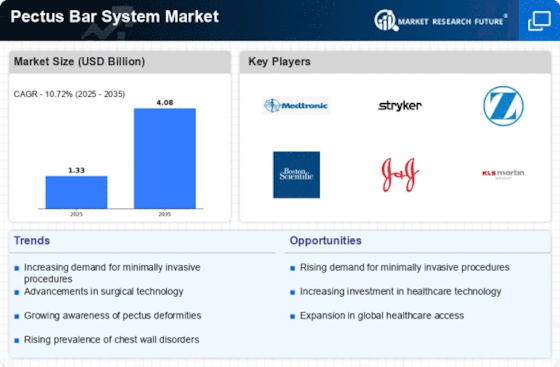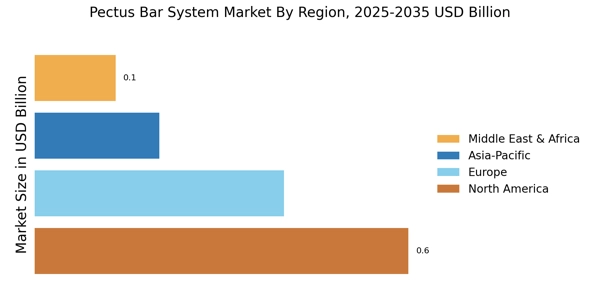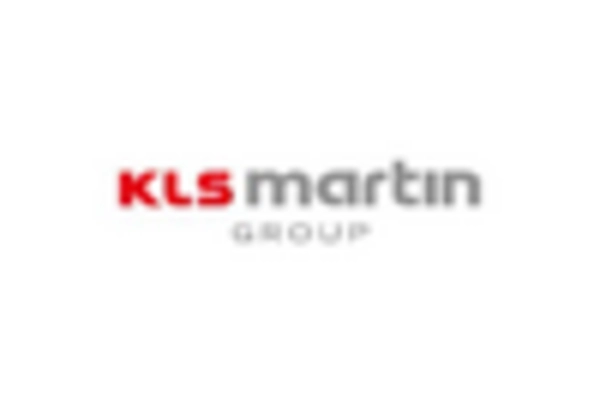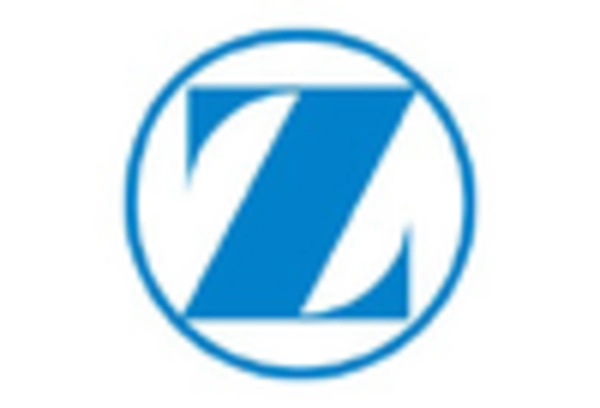Rising Prevalence of Pectus Deformities
The increasing incidence of pectus deformities, such as pectus excavatum and pectus carinatum, is a primary driver for the Pectus Bar System Market. Studies indicate that these conditions affect approximately 1 in 300 to 1 in 1,000 individuals, leading to a growing demand for effective treatment options. As awareness of these deformities rises, more patients seek surgical interventions, thereby propelling the market forward. The Pectus Bar System Market, known for its minimally invasive approach, is gaining traction among healthcare providers. This trend is likely to continue, as advancements in surgical techniques and materials enhance the efficacy of these systems, making them a preferred choice for both patients and surgeons. Consequently, the market is expected to expand as healthcare systems adapt to meet the needs of this demographic.
Increase in Pediatric and Adolescent Surgeries
The rise in surgical interventions among pediatric and adolescent populations is a significant driver for the Pectus Bar System Market. Pectus deformities are often diagnosed during childhood or adolescence, leading to a higher demand for corrective surgeries in these age groups. As healthcare providers increasingly recognize the importance of addressing these conditions early, the number of surgeries performed on younger patients is likely to grow. This trend is supported by data indicating that approximately 80% of pectus surgeries are conducted on patients under the age of 18. The Pectus Bar System Market, with its minimally invasive nature, is particularly appealing for this demographic, as it offers reduced recovery times and less postoperative discomfort. As a result, the market is poised for expansion as more families seek effective treatment options for their children.
Rising Investment in Healthcare Infrastructure
The increasing investment in healthcare infrastructure is a crucial factor driving the Pectus Bar System Market. Governments and private entities are allocating substantial resources to enhance surgical facilities and improve patient care. This investment is particularly evident in developing regions, where access to advanced medical technologies is expanding. Enhanced healthcare infrastructure facilitates the adoption of innovative surgical techniques, including the use of pectus bar systems. As hospitals and surgical centers upgrade their capabilities, the availability of these systems is likely to increase, thereby boosting market growth. Furthermore, improved healthcare access and affordability may lead to a higher volume of surgeries performed, further propelling the demand for pectus bar systems. This trend suggests a positive outlook for the market as healthcare systems evolve to meet the needs of patients.
Technological Advancements in Surgical Procedures
Technological innovations in surgical procedures are significantly influencing the Pectus Bar System Market. The introduction of advanced imaging techniques and robotic-assisted surgeries has improved the precision and outcomes of pectus surgeries. These advancements not only enhance the safety of procedures but also reduce recovery times, making them more appealing to patients. Furthermore, the integration of 3D printing technology allows for the customization of pectus bars, catering to individual patient anatomies. As these technologies continue to evolve, they are likely to drive the adoption of pectus bar systems, leading to an increase in market share. The ongoing research and development in this field suggest a promising future for the Pectus Bar System Market, as healthcare providers increasingly embrace these innovations.
Growing Awareness and Education on Pectus Conditions
The heightened awareness and education surrounding pectus conditions are pivotal in driving the Pectus Bar System Market. Campaigns aimed at educating both healthcare professionals and the public about the implications of untreated pectus deformities have led to increased diagnosis and treatment rates. As more individuals become informed about the potential health risks associated with these conditions, they are more likely to seek surgical solutions. This trend is reflected in the rising number of surgical procedures performed annually, which has been reported to increase by approximately 10% in recent years. Consequently, the demand for pectus bar systems is expected to rise, as patients opt for effective and minimally invasive treatment options. This growing awareness is likely to sustain market growth in the foreseeable future.

















